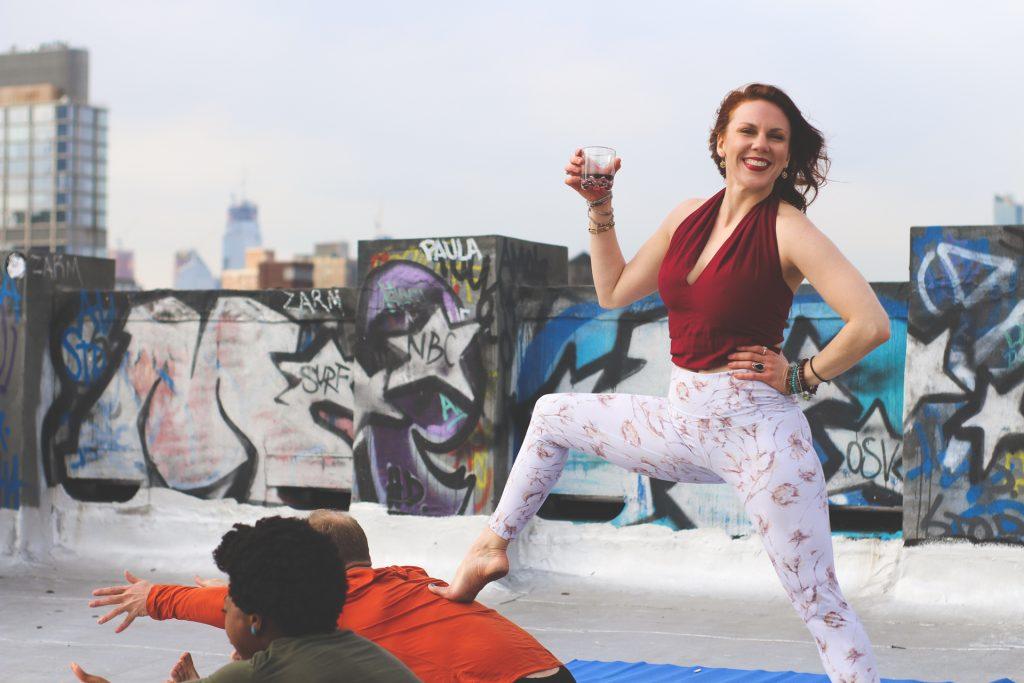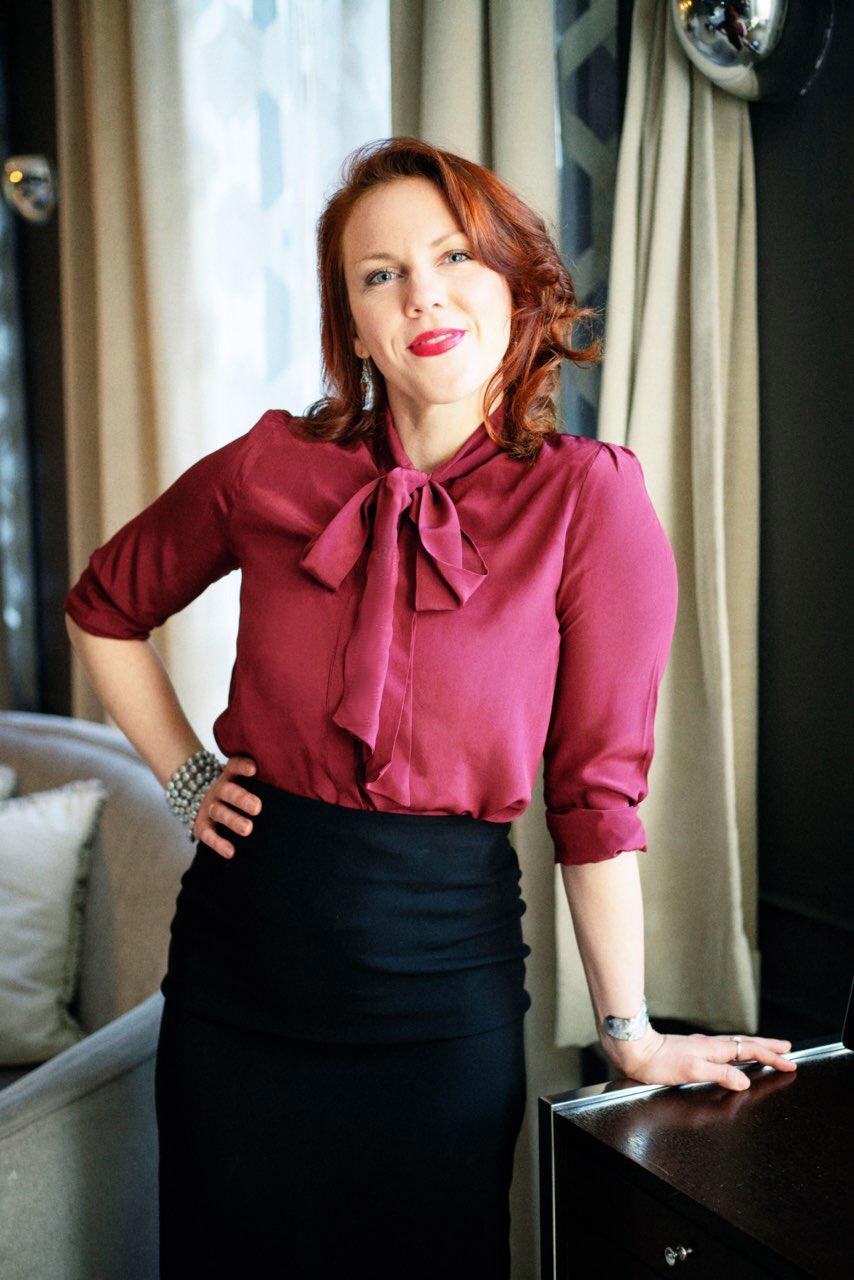Eli Walker founded Drunk Yoga because it meshed with her love for the practice and served as a reminder to never stop playing. Her story is one of empowerment and consistently overcoming obstacles, from personal traumas to physical ones. We had the pleasure of sitting down with Eli to discuss the inspiration behind Drunk Yoga, as well as what might be coming in the future.
Grit Daily: You had your own adventures before “Drunk Yoga.” Share those.
Eli Walker: I grew up in rural Wisconsin and set flight for Manhattan when I received a scholarship to attend New York University’s Tisch School of the Arts for Acting. After graduating, it wasn’t long before my passion and unique talent for using performance as a tool to cultivate awareness of the physical and spiritual body led me to yoga. Yoga inspired me to use movement, breath and meditation to fearlessly work, play and dream in all realms of truth, and inspire others to do the same.
I completed my 500 hour RYT in Manhattan, and pursued additional training in Iyengar, Reiki, Reflexology and Vipassana meditation in India during a 6-month solo-backpacking trip across the country, prompted by a desperate need to understand where “free will” and “divine orchestration” converge–which developed in the wake of an abusive relationship with my yoga teacher. My spiritual quest ended with a visit to Thailand, where I fell through a roof (long story) and severely injured my back, leaving me immobile for several weeks on the island of Koh Tao.
On my return to New York City, my injuries led me to Katonah Yoga, an esoteric practice developed by Nevine Michaan, which combines Hatha, Sacred Geometry and Taoist philosophy that teaches students to explore a relationship to the physical body using imagination to discover one’s center through circumference. This practice was a game-changer for me, as it helped me not only to heal my back, but also spiritually come to terms with the phenomena of what it means to be in a human body, which, until then, had been the catalyst for many sleepless nights.
The language and practice of Katonah Yoga helped me develop a more powerful and conscious relationship to time and space, my responsibility as an autonomous being to set up the conditions for my own happiness, and the invisible universal forces that map it all together.
Drawing from all of these experiences, I developed techniques to weave together my knack for storytelling and performance with my expanse of yogic knowledge to empower my students and audiences to be the author of their life’s own epic journey, eventually giving birth to both Divine Your Story and Drunk Yoga in 2017.
I now split my time between Beacon, New York and Bali, and am busy writing my next one-woman show, Kill the Buddha, premiering in 2021.
GD: Why drink during exercise? Mere pedestrians, most of us have been told not to drink during exercise or while operating heavy machinery.

EW: Great question! While it might sound like “Drunk Yoga” means “get drunk and do yoga,” it’s actually a cheeky, suggestive name for an otherwise uplifting yoga company.
First, “Drunk Yoga” is the name of my brand. At its core, it means “intoxicating the convention of yoga by making it social and interactive, rather than traditionally militaristic, dogmatic and/or quietly introspective. We make yoga fun and accessible to newbies and corporate teams by infusing a “serious” practice with the social ritual of a happy hour or your morning coffee.
Second, while we teach the art of cultivating joy through community engagement through the vehicle of a beginner-friendly yoga class, we wouldn’t necessarily classify Drunk Yoga to be a “fitness class.” Happy hours and parties (like birthdays and bachelorettes) bring us together, and yoga uses mindful movement to help us connect to ourselves. So, I married the two together to turn the healing art of yoga into an entertainment experience that combats loneliness and isolation. In short? It’s not about “yoga” or “wine,” it’s about celebrating unity through community. By doing this, we take the pressure out of the practice and infuse it with levity and fun.
Fun fact:
My lightbulb moment sprang from a friendly conversation at a Manhattan bar with the owner–an old friend of mine–in September 2017.
My friend said, “Eli, you’re a yoga teacher? You should teach me yoga. I can’t even touch my toes.” To prove it, he bent over, but surprisingly…he did and remarked, “Huh. I guess I can do it when I’m drunk.”
*Cue lightbulb*
I exclaimed, “Let’s do Drunk Yoga!”
He laughed.
I interrupted, excitedly, “No, I’m serious! I have an idea. Can I teach yoga classes here at the bar?”
Thus the Drunk Yoga revolution.
Again, the name “Drunk Yoga” is cheeky, not descriptive, it’s still triggering for some. When Drunk Yoga first gained press momentum, the concept of infusing wine into a yoga practice was so new and subversive I received backlash from yogis worldwide.
Still, I persisted. I knew my innovation combated the loneliness epidemic in America, as Drunk Yoga artfully infuses social ritual (like a happy hour or your morning coffee) with beginner yoga in unconventional yet familiar settings, like bars, hotels and offices to bring people together. Classes include icebreaker questions, “throwback” music, dancing, and lighthearted “rules” (Ex: If you mix up your left and right, you must say something you’re grateful for!).
My goal is to reignite an appreciation for the power of kindness through inter-connectivity.
The world can be a lonely, isolating, intimidating place; a yoga class doesn’t have to be.
GD: Just how drunk should we get? Inquiring minds want to know for scientific purposes.
EW: Ha! You shouldn’t get drunk at all. Again, “drunk” in the name Drunk Yoga is cheeky and suggestive (albeit provocative), but not descriptive. We never serve more than two glasses of wine (or one cocktail) per live event, and we have a strict “no pre-gaming” policy for our virtual events.
GD: Are we talking just wine? Or other drinks?
EW: Our Signature Drunk Yoga class includes wine. Now that most of our business model is about curating private parties and team-building events, we’ve opened our beverage selection to unique cocktails, coffee, tea, smoothies, and no beverage at all! Anything that brings you together in celebration of happiness is the drink of choice.
GD: Is this not mere “novelty” like “goat yoga?”
EW: Ah yes. Goat Yoga. Of course, both Drunk Yoga and “goat yoga” share the notion that yoga can be fun and deviant. And while I’d be rich if I had a nickel for every time someone asked me, “Is Drunk Yoga like ‘goat yoga’?”, Drunk Yoga is much more than a novelty.
In founding Drunk Yoga, I pioneered a new genre of yoga: “Yoga Entertainment,” that integrates interactive performance art and storytelling for the purpose of fostering camaraderie with guided movement. (We just so happen to do this through fun throwback pop music and silly drinking games!)
Actually, a lot of thoughtful customization goes into creating our private, community-building Drunk Yoga experiences, particularly for team-building. We curate special events that lift the spirit(s) of companies around the world, tailoring games, music and storytelling exercises to each company for optimum joy-sparking.
GD: Is there a “virtual” option?
EW: Yes! We offer virtual corporate team-building classes, virtual Happiness Workshops, and virtual-private parties for birthdays and bachelorettes, and even date nights.
We pivoted to virtual events pretty quickly as soon as the pandemic hit. It was a challenge at first simply because of the interactive nature of our classes. Most digital yoga classes work because they follow a “monkey see/monkey do” format, i.e. students on mute, perhaps even with their videos turned off, while following along with the teacher to work up a sweat. (Which is great and at the end of a long week; totally needed!)
But in my case, I needed to problem-solve how to teach/host our experiences in such a way that helped remote participants feel included, inspired to be present and connect/converse, and most importantly, have a good time. My challenge was to make a virtual yoga class via Zoom feel like an inclusive happy hour. After 2-3 weeks of intense trial and error (shout out to my Drunk Yoga instructors for being willing to jump on countless test video calls in April!), we figured out the recipe. It’s been smooth sailing since.
Most of our issues were technical–navigating the best software for our purposes, etc. And, of course, I needed to figure out how to scale our virtual events easily and quickly, as we have about 10 instructors across the country and now a global audience!

